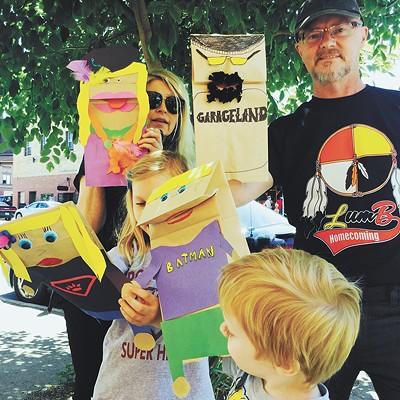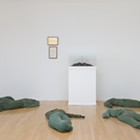To great applause, Pastor Percy "Happy" Watkins approaches the stage at the Spokane Convention Center in a crisp tan suit. He's "back by popular demand," says Freda Gandy, executive director of the Martin Luther King, Jr. Family Outreach Center, standing at the podium to greet him.
He walks slower than he used to, clutching a cane in his right hand. He can feel weather in his bones.
On Aug. 28, 1963, Dr. King delivered his iconic "I Have a Dream" speech on the steps of the Lincoln Memorial. Pastor Watkins has memorized 599 words of it. There was a time, not too long ago, when Watkins would recite the speech up to 40 times in a three-week period in January. Since the first time he did it at a luncheon with Gov. Booth Gardner in 1987 — without any notes, as the the audience wept — schools, churches, hospitals and news stations from as far as Los Angeles and Boise have called him every year, requesting his famous rendition.
But at 73, with an aching knee, Watkins has had to start turning requests down. Still, he's already given the speech nine times since last Wednesday. He'll do it three times on Martin Luther King, Jr. Day on Monday, starting at the Convention Center. He'll do it twice on Tuesday, once on Wednesday and once again on Friday.
"Then I'll get more calls," he says. "People call at the last minute." That's always been the pastor's biggest problem, he says: "Not knowing how to say 'No.'"
At the Convention Center, Watkins hands his cane to an attendant. He grips the podium on both sides and leans his weight against it. Before every speech, the pastor whispers a silent prayer. He appeals to the Angels of Memorization that he remember all of the words. He asks God to help him speak clearly and full of passion. Give me the words, he prays, so they understand.
He's been preparing for this moment since summer. He needs to take his mind back to 1954. At his office at New Hope Baptist Church in East Central, he reads his worn, paperback copy of King Remembered by Flip Schulke and Penelope McPhee. He pages through his expansive collection of history books on the civil rights movement. He reads about the lynchings and the murders in the South; the black World War II soldiers who returned home and couldn't eat in the same restaurants as the German POWs; Emmett Till, who whistled at a white woman and died for it; the children in Selma who were accosted by police with high-pressure fire hoses that could rip the bark off trees. The stories enrage him. It's hard not to be bitter.
But King said something that resonated with Watkins: If a man didn't have a cause for which to die, he wasn't fit to live.
"I'm standing on the shoulders of the Kings and the other people who dared to dream and dared to take the licks, so people could have a better life," Watkins says, "and that's what I want to do."
On stage, he raises one fist to the sky. His voice trembles and roars while the audience stands and cheers. Watkins bellows into the mic the final words of Dr. King's speech: "Free at last! Free at last! Thank God Almighty, we are free at last!" ♦






















